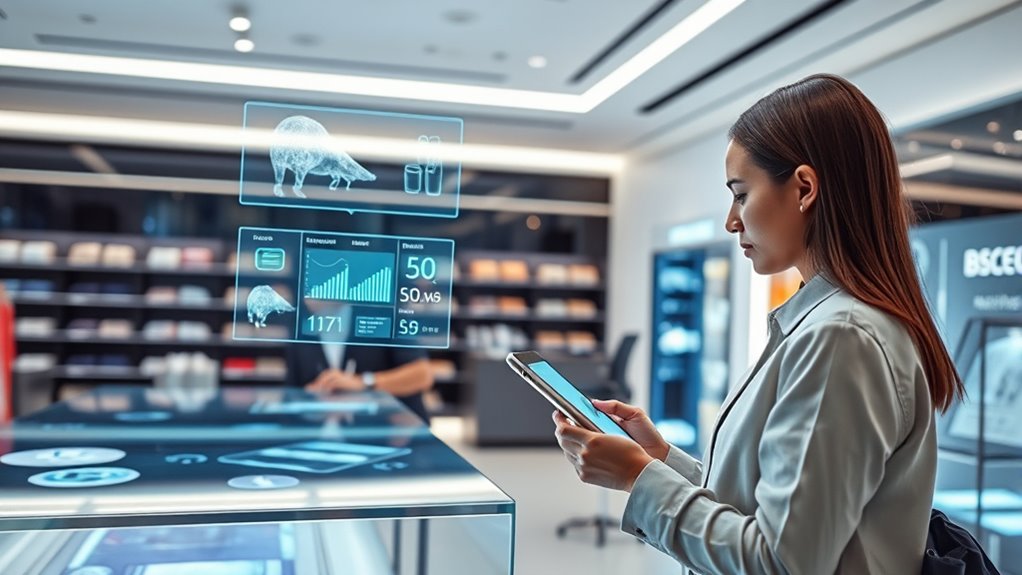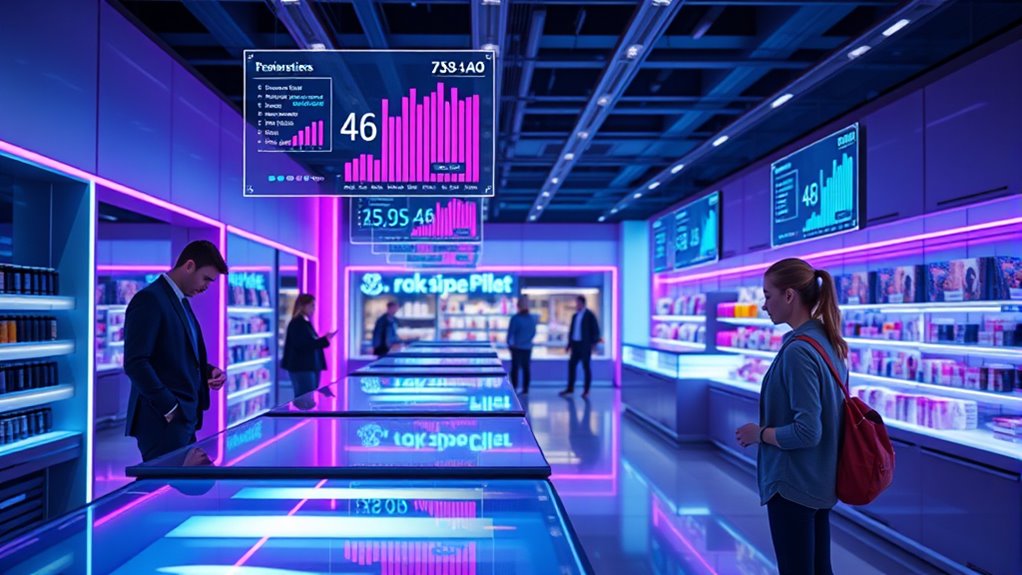AI now turns impulse buying into precision predictions, personalizing your shopping experience in real-time. It analyzes your behaviors to suggest products, discounts, and offers tailored to your preferences, making spontaneous purchases more targeted and effective. By adjusting prices dynamically and using social media cues, AI influences your decisions with subtle emotional triggers. As technology advances, you’ll discover how AI creates smarter, more efficient shopping—all the details behind this transformation lie ahead.
Key Takeaways
- AI analyzes consumer behavior to deliver personalized product suggestions, reducing the need for impulsive decisions.
- Dynamic pricing and targeted offers create urgency, guiding consumers toward planned, rather than impulsive, purchases.
- AI-driven predictive analytics forecast optimal timing for offers, aligning marketing efforts with consumer receptivity.
- Social media integrations leverage visual cues and influencer content to influence purchase intent more precisely.
- Inventory management and logistics optimization ensure product availability, supporting planned purchases over impulsive ones.

Artificial intelligence is transforming how consumers make spontaneous purchases by shifting from random impulses to precise predictions. Instead of relying solely on gut reactions or momentary urges, AI analyzes your online shopping behaviors to personalize product suggestions tailored specifically to your preferences, like size, color, or style. This targeted approach prompts you to buy impulsively because the recommendations feel relevant and timely. When you browse a retailer’s site, AI adjusts prices dynamically based on demand, inventory, and competitors, making some deals irresistible and encouraging you to act quickly. It also creates personalized discounts, flash sales, and coupon codes during your session, further nudging you toward immediate purchases. These tactics harness your emotional triggers, making impulse buying more calculated and effective. In fact, personalized product recommendations account for up to 31% of e-commerce revenue by showing you items you’re most likely to buy on impulse, which benefits retailers while satisfying your desire for quick gratification. AI-powered cross-selling and up-selling strategies also boost your average order value by about 11% and increase conversion rates by roughly 26%, making your shopping experience more engaging and profitable for merchants. Additionally, the integration of AI in logistics helps retailers manage inventory more efficiently, ensuring that popular items are always available to meet spontaneous demand. Nearly half of consumers, including you, have made impulse purchases directly prompted by AI-driven suggestions. Personalization programs can improve your satisfaction by up to 20%, encouraging you to buy more often and more confidently. Millennials tend to be more impulsive online, with 11% making purchases upon first sight—higher than Gen Z at 8%. Social media platforms like TikTok and Instagram serve as major discovery tools, using influencers and shoppable content to trigger spontaneous buying. Limited-time offers, scarcity cues, and urgency tags create emotional pressure, compelling you to purchase instantly. Retailers also optimize frictionless checkout options like one-click purchasing, Buy Now Pay Later, and digital wallets, making it easier for you to act on impulse. By leveraging advanced AI analytics, retailers can even predict when you’re most likely to be receptive to such offers, further increasing impulsive buying opportunities.
Frequently Asked Questions
How Accurate Are AI Predictions in Different Industries?
AI predictions are highly accurate across industries, with accuracy rates between 80-95%. You’ll find that in marketing, AI models deliver 78% data accuracy, boosting sales and customer engagement. In supply chains, AI minimizes stock issues with real-time forecasts. Healthcare, finance, retail, and manufacturing also benefit from AI’s precision, helping you make better decisions, optimize resources, and stay ahead of market changes.
What Ethical Concerns Arise With Ai-Driven Purchase Predictions?
You should be aware that AI-driven purchase predictions raise ethical concerns like privacy violations, bias, and unfairness. Your data might be gathered without clear consent, risking misuse and discrimination against certain groups. Additionally, AI’s lack of transparency can erode trust and make it hard to hold anyone accountable. You need ethical safeguards and transparent practices to ensure consumer rights are protected and that AI use remains fair and respectful.
How Does AI Impact Consumer Privacy and Data Security?
AI considerably impacts your privacy and data security by collecting vast amounts of personal information to function effectively. You might worry about data breaches, unauthorized access, or misuse of your data. Many consumers feel they lack control over their information, and AI’s data hunger raises concerns about online privacy. To protect yourself, demand transparency from companies, use privacy settings, and stay informed about how your data is collected and used.
Can AI Completely Eliminate Impulsive Buying Behaviors?
AI can’t completely eliminate impulsive buying behaviors because these actions are deeply rooted in emotional and psychological responses. You might think AI could stop spontaneous purchases, but it mainly influences and predicts them. Your impulses often happen suddenly and contextually, making full control impossible. Plus, social, cultural, and personal factors still play significant roles. So, while AI can reduce impulsivity, it can’t entirely prevent it from happening.
What Are the Limitations of Current AI Prediction Models?
You should know that current AI prediction models face several limitations. They depend heavily on large, high-quality data, which isn’t always available or unbiased. Complex models can be hard to interpret, making it tough to trust their outputs. They also struggle to adapt quickly to unexpected market shifts or black swan events. Plus, they mainly focus on quantifiable data, often missing the human emotions and social nuances behind impulse buying.
Conclusion
You might be surprised to learn that 70% of impulse purchases are driven by emotional triggers. With AI’s precision prediction, you can avoid unnecessary spending and make smarter choices. By analyzing your habits and preferences, AI helps you plan better, reducing impulsive buys. This technology not only saves you money but also empowers you to shop more intentionally. Embracing AI’s capabilities means you take control of your spending, turning impulsive habits into thoughtful decisions.








